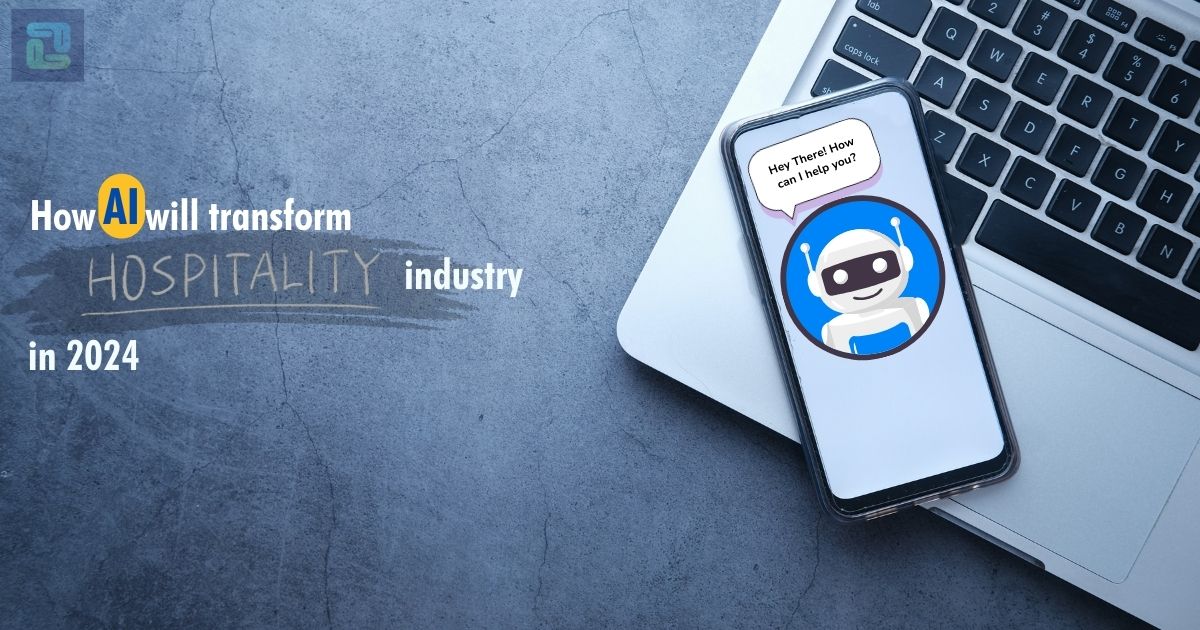Embracing Artificial Intelligence in Hospitality: Transforming Operational Efficiency

Explore the power of artificial intelligence in hospitality and its impact on operations
In recent years, the hospitality industry has witnessed a rapid shift toward the adoption of new technologies. One of the most significant technological advances revolutionizing the sector is Artificial Intelligence (AI). From customer service to back-end operations, AI has been at the forefront of enhancing efficiency, improving guest experiences, and streamlining various aspects of hotel management. This blog delves into how AI is being adopted in the hospitality sector and its profound impact on operational efficiency.
Introduction to AI in Hospitality
Artificial Intelligence refers to the development of systems that can perform tasks that typically require human intelligence, such as decision-making, problem-solving, and learning. In the hospitality industry, AI has emerged as a game-changer, particularly in areas such as customer interaction, inventory management, and predictive analytics.
The hospitality sector thrives on providing excellent guest experiences while managing operations efficiently. The implementation of AI tools and technologies has created a paradigm shift, allowing businesses to automate repetitive tasks, optimize resources, and create personalized experiences for guests. As hotels and other establishments continue to adopt AI, they are finding innovative ways to maintain a competitive edge while improving customer satisfaction.
The Changing Landscape of Hotel Operations with AI
AI is reshaping the hotel industry by automating routine tasks and creating seamless interactions between guests and service providers. The integration of AI-based solutions like chatbots, virtual assistants, machine learning, and IoT (Internet of Things) is helping hotels optimize their operations and provide personalized experiences to their guests.
Impact of AI on Customer Service
One of the most visible impacts of AI in hospitality is its role in customer service. AI-powered solutions, such as chatbots and virtual assistants, are now widely used to manage guest queries, bookings, and even room service requests. These AI-driven tools can offer round-the-clock assistance, handle multiple languages, and significantly reduce response times.
Chatbots and Virtual Assistants
One of the key innovations is the use of AI chatbots to handle booking inquiries and customer service. These AI-driven bots are capable of conversing with guests in multiple languages, offering a natural and personalized experience through natural language processing (NLP). They provide 24/7 availability, quick responses, and tailored options based on customer preferences. This shift allows hotel staff to focus on more critical tasks while AI handles routine queries.
A great example is the incorporation of AI to offer predictive recommendations for additional services like spas, restaurants, or even local tours. By understanding customer preferences, AI-driven systems help increase upselling opportunities, which directly impacts hotel revenue.
Virtual assistants, such as Amazon’s Alexa or Google Assistant, are also being integrated into hotel rooms. These AI assistants allow guests to control in-room features, such as lighting and temperature, and access information about hotel amenities or local attractions. Such integration enhances the guest experience by offering personalized, hands-free convenience.
IoT and the Emergence of Smart Hotels
Internet of Things (IoT) technology is ushering in the era of smart hotels where rooms are equipped with interconnected devices that provide an unprecedented level of comfort and convenience for guests. From adjusting room lighting and temperature to automating check-ins and voice-enabled room controls, IoT devices, when combined with AI, create a personalized guest experience.
In this context, AI-enabled smart rooms allow guests to use voice commands to control their environment, from managing entertainment systems to ordering room service. The Wynn Las Vegas hotel, for instance, has incorporated Amazon Alexa into its rooms, enabling guests to control room settings using just their voice.
Moreover, by collecting data from IoT devices, hotels can offer hyper-personalized recommendations for activities, dining, and entertainment based on a guest’s preferences or even provide real-time information about local attractions.
Personalization Through AI
AI enables hotels to provide a more personalized experience by analyzing guest data. AI algorithms can assess a guest’s preferences based on past behaviors, such as room choices, dietary preferences, or the frequency of specific amenities used. By leveraging this data, hotels can offer customized services tailored to individual guests, such as personalized welcome messages, room upgrades, or special amenities that match their preferences.
This level of personalization helps foster customer loyalty, as guests are more likely to return to a hotel that understands their needs and offers a personalized experience.
AI’s Role in Enhancing Operational Efficiency
While AI’s contribution to customer service is evident, its role in operational efficiency is equally impactful. AI-powered solutions help streamline various backend operations, allowing hotels to optimize resources, reduce costs, and improve decision-making.
Predictive Analytics for Demand Forecasting
One of the critical challenges in the hospitality industry is managing demand fluctuations. Whether it’s adjusting room rates based on occupancy levels or predicting guest demand for services such as dining or spa appointments, accurate forecasting is crucial.
AI-driven predictive analytics tools can analyze historical data, market trends, weather forecasts, and local events to make accurate predictions about demand. This helps hotels optimize pricing strategies, ensure adequate staffing levels, and manage inventory more efficiently. For example, if AI predicts a high demand for rooms during a local event, the hotel can adjust its pricing accordingly, maximizing revenue.
Automation of Repetitive Tasks
AI-powered automation is transforming how hotels manage repetitive tasks. Whether it’s housekeeping scheduling, inventory management, or guest check-ins, AI tools can automate these processes, reducing the need for manual intervention.
For example, AI can be used to automate the check-in/check-out process through mobile apps, eliminating the need for long lines at the front desk. Additionally, robotic assistants are being employed in some hotels to handle luggage, deliver room service, and even perform housekeeping tasks. These robots can work around the clock, improving efficiency and reducing labor costs.
Inventory and Supply Chain Optimization
AI can also enhance inventory management and supply chain operations in hospitality. For example, AI-powered tools can track inventory levels in real-time, predict when supplies will run low, and automatically place orders to replenish stock. This reduces the risk of running out of essential supplies, such as toiletries, linens, or food items, ensuring that hotels are always well-prepared to meet guest needs.
AI can also optimize supply chain management by identifying the most efficient delivery routes, predicting potential disruptions, and negotiating better contracts with suppliers. This helps hotels reduce waste, save on procurement costs, and improve overall operational efficiency.
AI in Revenue Management
Revenue management is a critical aspect of hospitality operations, and AI plays a significant role in optimizing pricing strategies. Dynamic pricing models powered by AI can analyze various factors, such as market demand, competitor pricing, and guest booking behavior, to recommend optimal room rates in real-time.
AI-driven revenue management systems (RMS) use machine learning algorithms to continuously adjust pricing based on changing conditions. This allows hotels to maximize revenue during high-demand periods while offering competitive rates during off-peak times. The ability to accurately forecast demand and adjust pricing accordingly gives hotels a significant advantage in maximizing profitability.
AI for Enhanced Security and Safety
Security is a top priority in the hospitality industry, and AI is making significant contributions in this area. AI-powered surveillance systems use facial recognition and behavioral analysis to detect potential threats, such as unauthorized access or suspicious behavior, in real-time. These systems can alert security personnel immediately, allowing them to respond quickly to potential security breaches.
AI is also being used to enhance cybersecurity in hotels. With the increasing reliance on digital platforms for bookings, payments, and guest data management, cybersecurity has become a critical concern. AI-driven cybersecurity solutions can detect and prevent cyberattacks by identifying unusual patterns of behavior in network traffic, safeguarding sensitive guest information from potential breaches.
AI in Hotel Communications
Another area where AI is making a significant impact is in improving internal communication between hotel staff and management. AI tools can help manage and streamline internal communications, ensuring that tasks are efficiently distributed and completed. This leads to faster problem resolution and a more responsive service environment.
By integrating AI-powered communication tools, hotels can ensure that guest requests are handled quickly and efficiently, improving overall guest satisfaction. Additionally, AI can facilitate contactless communication, allowing guests to interact with hotel services through their smartphones or other digital devices.
AI-Driven Sustainability in Hospitality
Sustainability is becoming a growing focus in the hospitality industry, with many establishments looking to reduce their environmental footprint. AI can play a significant role in this endeavor by optimizing energy management and reducing waste.
Energy Efficiency
AI-powered systems can monitor and control energy usage in real-time, adjusting heating, cooling, and lighting based on occupancy and usage patterns. For instance, AI can detect when a guest leaves a room and automatically adjust the temperature or turn off unnecessary lights, leading to significant energy savings.
Some hotels are even implementing AI-powered systems that predict energy demand based on factors such as occupancy levels, weather forecasts, and historical usage patterns. This allows hotels to optimize energy consumption, reduce their carbon footprint, and lower operational costs.
Waste Reduction
AI can also help reduce food waste in hotel restaurants by analyzing guest preferences, consumption patterns, and inventory levels. AI-driven systems can predict the quantity of food required for specific events or meal services, helping chefs prepare the right amount of food and avoid overproduction.
Additionally, AI can assist in recycling efforts by identifying materials that can be repurposed or reused. This helps hotels reduce their environmental impact and align with sustainability goals, which are increasingly important to eco-conscious travelers.
The Future of AI in Hospitality
The adoption of AI in the hospitality industry is still in its early stages, and there is much more potential to explore. As AI technology continues to advance, we can expect even more sophisticated applications, such as enhanced personalization, real-time language translation, and fully autonomous hotel experiences.
AI will likely play a crucial role in the future of hospitality, enabling businesses to operate more efficiently, deliver exceptional guest experiences, and adapt to changing market conditions. As AI becomes more accessible and affordable, even smaller hospitality businesses will be able to benefit from its transformative potential.
In conclusion, AI is revolutionizing the hospitality industry by improving both customer service and operational efficiency. From predictive analytics to AI-driven personalization, the adoption of AI is enabling hotels to streamline processes, enhance guest experiences, and optimize revenue. However, as with any technological advancement, it is important for the industry to address the challenges and ethical considerations associated with AI adoption. By doing so, hospitality businesses can leverage AI to build a sustainable, efficient, and customer-centric future.
